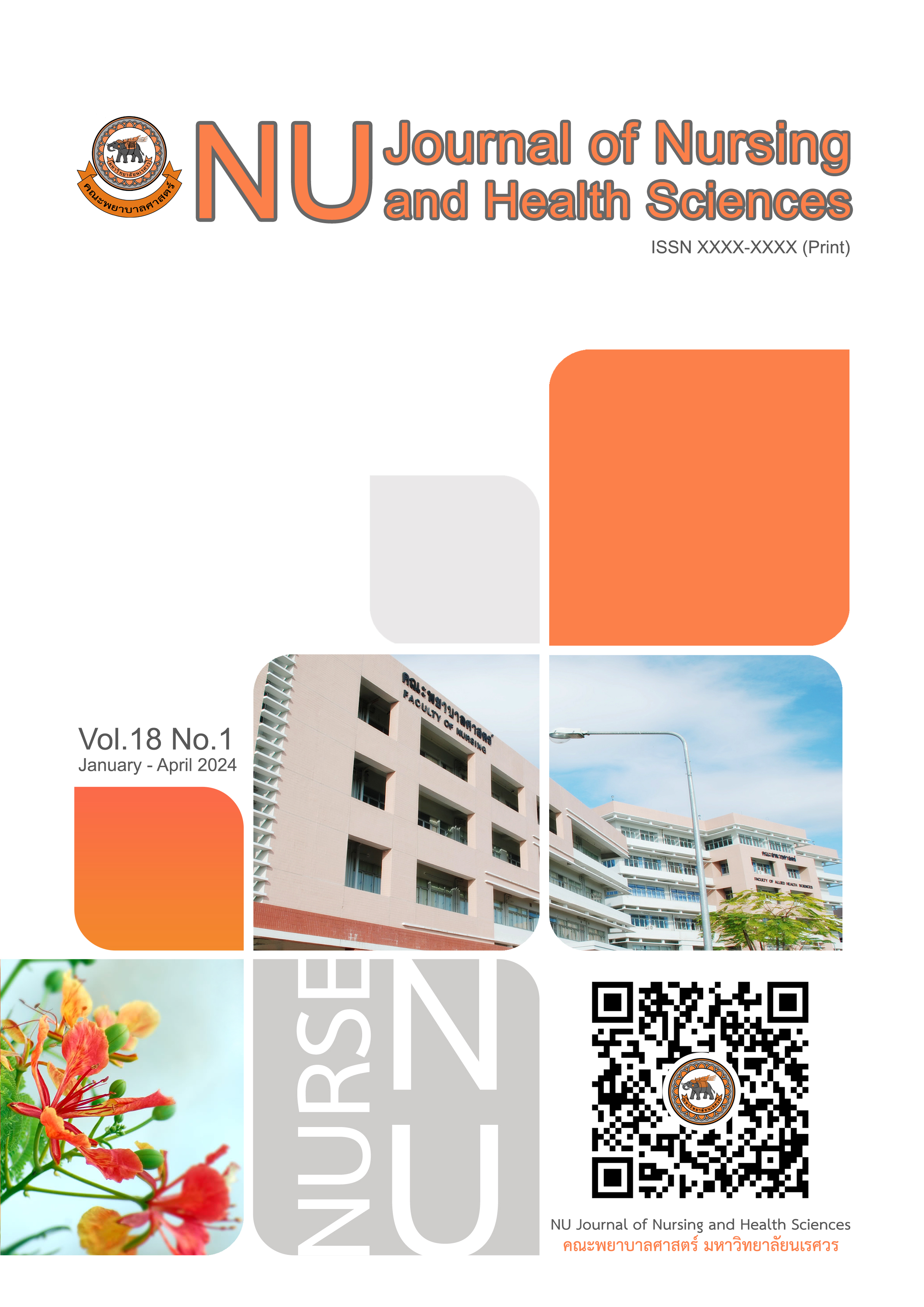ผลของโปรแกรมการจัดการความรู้ต่อพฤติกรรมการให้คำปรึกษาเกี่ยวกับการจัดการเชื้อดื้อยาต้านจุลชีพของผู้บริหารทางการพยาบาลระดับต้น ในโรงพยาบาลตติยภูมิแห่งหนึ่ง
Main Article Content
บทคัดย่อ
การวิจัยครั้งนี้เป็นการวิจัยกึ่งทดลองศึกษาแบบสองกลุ่มวัดผลก่อนและหลังการทดลองมีวัตถุประสงค์เพื่อศึกษาผลของโปรแกรมการจัดการความรู้ต่อพฤติกรรมการให้คำปรึกษาเกี่ยวกับการจัดการเชื้อดื้อยาต้านจุลชีพของผู้บริหารทางการพยาบาลระดับต้นในโรงพยาบาลตติยภูมิแห่งหนึ่งกลุ่มตัวอย่างเป็นผู้บริหารทางการพยาบาลระดับต้นที่ปฏิบัติหน้าที่ในหน่วยงานที่พบปัญหาเชื้อดื้อยาต้านจุลชีพจำนวน 60 คนแบ่งเป็นกลุ่มทดลองและกลุ่มควบคุม กลุ่มละ 30 คน เครื่องมือที่ใช้ในการดำเนินการวิจัย ได้แก่ 1) โปรแกรมการจัดการความรู้เกี่ยวกับการจัดการเชื้อดื้อยาต้านจุลชีพประยุกต์จากแนวคิดการจัดการความรู้ของมาร์ควอร์ทประกอบด้วย แผนการสอน และ คู่มือการให้คำปรึกษาเกี่ยวกับการจัดการเชื้อดื้อยาต้านจุลชีพ และ 2)แบบวัดพฤติกรรมการให้คำปรึกษาตรวจสอบคุณภาพเครื่องมือได้ค่าดัชนีความเที่ยงตรงตามเนื้อหาเท่ากับ0.82และหาความเชื่อมั่นโดยหาค่าสัมประสิทธิ์แอลฟาของครอนบาคทั้งฉบับเท่ากับ0.96วิเคราะห์ข้อมูลโดยใช้สถิติเชิงพรรณนา สถิติทดสอบค่าทีชนิด 2กลุ่มสัมพันธ์กัน (paired sample t-test) และเป็นอิสระต่อกัน (independent t-test)ผลการวิจัย พบว่า คะแนนเฉลี่ยของพฤติกรรมการให้คำปรึกษาเกี่ยวกับการจัดการเชื้อดื้อยาต้านจุลชีพหลังเข้าร่วมโปรแกรมของกลุ่มทดลอง มากกว่ากลุ่มควบคุม อย่างมีนัยสำคัญทางสถิติที่ระดับ.05 และมากกว่าก่อนเข้าร่วมโปรแกรมอย่างมีนัยสำคัญทางสถิติที่ระดับ .05 ผลการวิจัยแสดงให้เห็นว่าโปรแกรมการจัดการความรู้สามารถช่วยส่งเสริมพฤติกรรมการให้คำปรึกษาเกี่ยวกับการจัดการเชื้อดื้อยาต้านจุลชีพของผู้บริหารทางการพยาบาลระดับต้นได้ ดังนั้นผู้บริหารควรนำโปรแกรมนี้กำหนดเป็นแนวทางการเตรียมความพร้อมผู้บริหารทางการพยาบาลระดับต้น ตลอดจนนำไปประยุกต์ใช้ในการส่งเสริมพฤติกรรมให้คำปรึกษาในสถานการณ์อื่นต่อไป
Article Details

อนุญาตภายใต้เงื่อนไข Creative Commons Attribution-NonCommercial-NoDerivatives 4.0 International License.
เอกสารอ้างอิง
American Nurses Association. (2021). Antibiotic-stewardship. Retrieved 11December 2022 from, https://www.nursingworld.org/practice-policy/project-firstline/on-the-go-resource/healthcare-acquired-infections/antibiotic-stewardship
Ahsan A., Dewi E.S., Suharsono T., Setyoadi S., Soplanit V.G., Ekowati S.I., … Laili, N. (2021). Knowledge management-based nursing care educational training: A key strategy to improve healthcare associated infection prevention behavior. SAGE Open Nursing, 7, 237-241.
Best, J. W., & Kahn, J. V. (2006). Research in education (10thed.). Boston: Pearson Education.
Centers for Disease Control and Prevention. (2006). Management of multidrug-resistance organisms in healthcare settings 2006. Retrieved 9 September 2022. From, https://www.cdc.gov/infectioncontrol/guidelines/mdro/index.html
Chaipalad, W., Hinjiranan, S., & Meehanpong, P. (2022). The effects of knowledge management of first-line nurse managers for patient preparation of medical imaging via intravenous administration of contrast media. Journal of Nursing Science Christian University, 9(2), 40-54. [In Thai].
Cohen, J. (1988). Statistical power analysis for behavioral sciences. (2nded.). Hillsdale, NJ: Lawrence Erlbaum.
Cormier, S., & Hackney, H. (2008). Counseling strategies and interventions (7thed.). Boston: Pearson Education.
Gagnon, M. P., Payne-Gagnon, J., Fortin, J. P., Paré, G., Côté, J., & Courcy, F. (2015). A learning organization in the service of knowledge management among nurses: A case study. International Journal of Information Management, 35(5), 636-642.
Gupta, K. K., Attri, J. P., Singh, A., Kaur, H., & Kaur, G. (2016). Basic concepts for sample size calculation: Critical step for any clinical trials!. Saudi Journal of Anesthesia, 10, 328-331.
Hujala, T., & Laihonen, H. (2021). Effects of knowledge management on the management of health and social care: A systematic literature review. Journal of Knowledge Management, 25(11), 203-221. doi: 10.1108/JKM-11-2020-0813.
Infection Prevention and Control Committee, Ratchaburi Hospital. (2022). Summary of surveillance of antimicrobial resistance in Ratchaburi Hospital (2020-2022). (document not published). Ratchaburi, Infection control and prevention nursing work group. [In Thai].
Kittikul, P., Singchungchai, P., & Aree, P. (2021). Effect of the knowledge management program on first-line nurse managers’ breastfeeding counseling behavior at a Tertiary Hospital. Journal of Nursing and Education, 14(3), 47-60. [In Thai].
Limmathurotsakul, D. (2022). Summary of drug-resistant infections 2021-2022: Meeting development of guidelines for situation analysis of AMR resistance management in Thailand. Supporting documents for the meeting of the public health administration division, Nonthaburi. Office of the permanent secretary, Ministry of Public Health. [In Thai].
Limpanyalert, P. (2023). (Apirl, 2020). 3P safety, hospital accreditation (HA) and Infection control: Academic conference on prevention and control of infection in hospitals. Supporting documents for Bamrasnaradura institute academic conference at the Grand richmond stylish convention hotel, Nonthaburi. [In Thai].
Marquardt, M.J. (1996). Building the Learning Organization: A System Approach to Quantum Improvement and Global Success. New York: McGraw-Hill.
National Antimicrobial Resistance Surveillance Center, Thailand: NARST. (2022). The situation of drug resistance in Thailand. Retrieved 10 January 2023 from, https://amrthailand.net/Home/Thailand
Nursing Department, Ratchaburi Hospital. (2021). The report of quality for nursing service indicators in 2021. Ministry of
public health. [In Thai].
Nursing Division. (2018). Roles and responsibilities of professional nurses according to practice. Nonthaburi: Suetawan. [In Thai].
Puntavungkool, J., & Deeya, K. (2020). Knowledge management in higher education institutions. Northeastern University academic and research journal, 10(3), 289-303. [In Thai].
Polit, D. F., Beck, C. T., & Owen, S. V. (2007). Is the CVI an acceptable indicator of content validity? Appraisal and recommendations. Research in Nursing & Health, 30, 459-467.
Salehi, K., Kermanshahi, S., Mohammadi, E., & Hassanzadeh, M. (2015). The exploration of challenges in clinical knowledge management in nurses: A qualitative study. Journal of Nursing and Midwifery Sciences, 2(4), 15-23.
Siripukdeekan, C., & Kulpukdee, R. (2020). Challenge of nurse administrators in the 21st. Journal of the police nurses, 12(1), 222-230. [In Thai].
Singchungchai, P. (2019). Innovative leadership in nursing management. The Southern College Network Journal of Nursing and Public Health, 6(1), 260-267. [In Thai].
Singchungchai, P., Khampalikit, S., & Nasae, T. (1996). Nursing research: Principle and process. Songkhla: Main textbook production project Faculty of Nursing Prince of Songkhla University. [In Thai].
Sumpradit, N. (2022). Summary of results of the implementation of the strategic plan for managing AMR 2022: Meeting national Antimicrobial Resistance management action plan. Supporting documents for the meeting of the division of public health administration, Nonthaburi. Office of the permanent secretary, Ministry of Public Health. [In Thai].
Unahalekhaka, A. (2018). Best practice guideline for prevention of multidrug resistant organisms transmission in hospitals. Chiangmai: Ming Muang. [In Thai].
World Health Organization. (2016). Regional strategy on prevention and containment of antimicrobial resistance 2010-2015. Retrieved 1 January 2016 from http://www.searo.who.int/LinkFiles/BCT_hlm-407.pdf
Yang, J. T. (2007). Knowledge sharing: Investigating appropriate leadership roles and collaborative culture. Tourism management, 28(2), 530-543.


